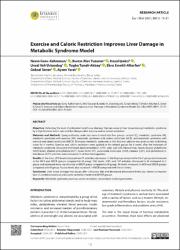| dc.contributor.author | Genç Kahraman, Nevin | |
| dc.contributor.author | Alev Tüzüner, Burçin | |
| dc.contributor.author | İpekçi, Hazal | |
| dc.contributor.author | Üstündağ, Ünsal Veli | |
| dc.contributor.author | Tunali Akbay, Tuğba | |
| dc.contributor.author | Emekli Alturfan, Ebru | |
| dc.contributor.author | Şener, Göksel | |
| dc.contributor.author | Yarat, Ayşen | |
| dc.date.accessioned | 2023-10-27T15:58:26Z | |
| dc.date.available | 2023-10-27T15:58:26Z | |
| dc.date.issued | 2021 | en_US |
| dc.identifier.issn | 2602-2575 | |
| dc.identifier.issn | 2618-6144 | |
| dc.identifier.uri | https://hdl.handle.net/11363/6096 | |
| dc.description.abstract | Objective: Detecting the level of antioxidant and tissue damage that can occur in liver tissue induced metabolic syndrome
by a high fructose diet in rats and the changes after exercise and/or caloric restriction.
Materials and Methods: Sprague-Dawley male rats were divided into five groups: control (C), metabolic syndrome (M),
metabolic syndrome with exercise (ME), metabolic syndrome with caloric restriction (MCR), and metabolic syndrome with
exercise and caloric restriction (MECR). To induce metabolic syndrome, a 10% fructose solution was given to rats in drinking
water for 3 months. Exercise and caloric restriction were applied to the related groups for 6 weeks after the induction of
metabolic syndrome. Glucose in the blood, lipid peroxidation (LPO), sialic acid (SA), hexosamine, mucin, fucose, glutathione
(GSH) levels, alkaline phosphatase (ALP), tissue factor (TF), superoxide dismutase (SOD), catalase (CAT), and glutathione-Stransferase (GST) activities were measured in rat liver homogenates.
Results: In the liver, LPO levels increased and TF activities decreased in the M group compared to the C group and increased
in the MCR and MECR groups compared to M group. GSH levels, SOD, and CAT activities decreased in M compared to C
group and increased more significantly in MECR group compared to M group. SA levels increased in MCR and MECR groups
compared with M group. Fucose levels also increased in MECR compared with the all others.
Conclusion: Liver tissue damage that occurs after a fructose diet and decreased antioxidant levels was shown to improve
best in combined exercise and caloric restriction treatment (MECR group). | en_US |
| dc.language.iso | eng | en_US |
| dc.publisher | İstanbul Üniversitesi Yayınevi | en_US |
| dc.relation.isversionof | 10.26650/EurJBiol.2021.912661 | en_US |
| dc.rights | info:eu-repo/semantics/openAccess | en_US |
| dc.rights | Attribution-NonCommercial-NoDerivs 3.0 United States | * |
| dc.rights.uri | http://creativecommons.org/licenses/by-nc-nd/3.0/us/ | * |
| dc.subject | Metabolic syndrome | en_US |
| dc.subject | Exercise | en_US |
| dc.subject | Caloric restriction | en_US |
| dc.subject | Antioxidant-oxidant parameters | en_US |
| dc.title | Exercise and Caloric Restriction Improves Liver Damage in Metabolic Syndrome Model | en_US |
| dc.type | article | en_US |
| dc.relation.ispartof | European Journal of Biology | en_US |
| dc.department | Diş Hekimliği Fakültesi | en_US |
| dc.authorid | https://orcid.org/0000-0003-2143-0088 | en_US |
| dc.authorid | https://orcid.org/0000-0001-5122-4977 | en_US |
| dc.authorid | https://orcid.org/0000-0003-1193-168X | en_US |
| dc.authorid | https://orcid.org/0000-0003-0804-1475 | en_US |
| dc.authorid | https://orcid.org/0000-0002-2091-9298 | en_US |
| dc.authorid | https://orcid.org/0000-0003-2419-8587 | en_US |
| dc.authorid | https://orcid.org/0000-0001-7444-6193 | en_US |
| dc.authorid | https://orcid.org/0000-0002-8258-6118 | en_US |
| dc.identifier.volume | 80 | en_US |
| dc.identifier.issue | 1 | en_US |
| dc.identifier.startpage | 15 | en_US |
| dc.identifier.endpage | 21 | en_US |
| dc.relation.publicationcategory | Makale - Ulusal Hakemli Dergi - Kurum Öğretim Elemanı | en_US |
| dc.institutionauthor | Alev Tüzüner, Burçin | |



















